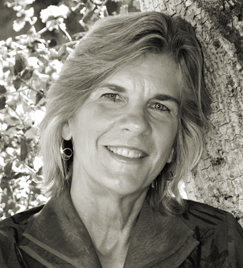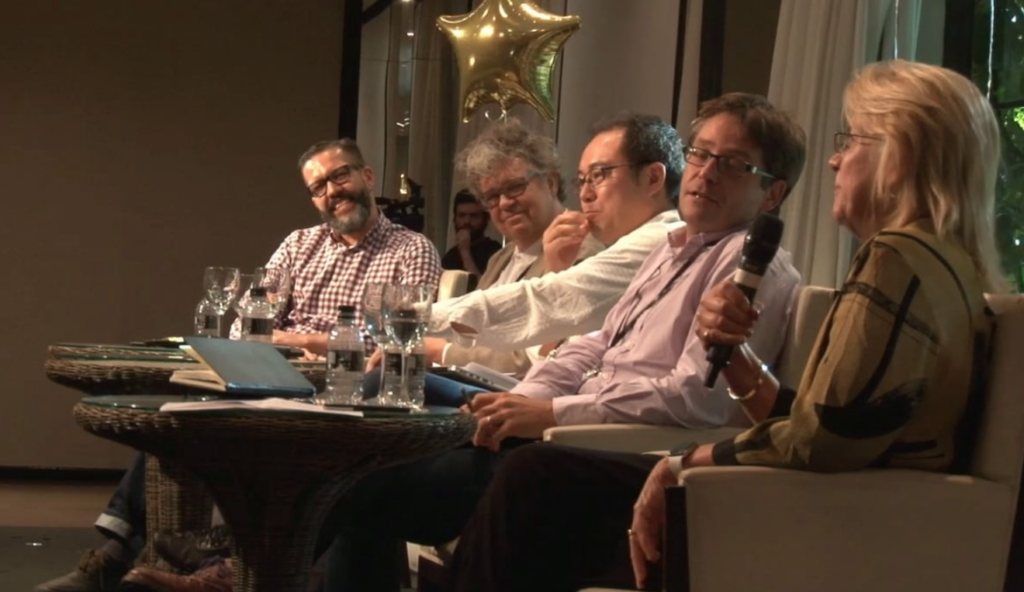 How can risk-taking propel an ethnographic career? Just ask Jeanette Blomberg, who is no stranger to professional risk-taking. Her career journey, including major contributions at foundational tech giants in Silicon Valley, has centered on making participation in various forms core to ethnographic work. Jeanette is Principal Researcher at IBM Research – Almaden Research Center (ARC), where she has been for 13 years. Previously, she was Director of Experience Modeling at Sapient, Professor at the Blekinge Institute of Technology in Sweden, and founding member of the Work Practice and Technology group at Xerox – PARC (Palo Alto Research Center).
How can risk-taking propel an ethnographic career? Just ask Jeanette Blomberg, who is no stranger to professional risk-taking. Her career journey, including major contributions at foundational tech giants in Silicon Valley, has centered on making participation in various forms core to ethnographic work. Jeanette is Principal Researcher at IBM Research – Almaden Research Center (ARC), where she has been for 13 years. Previously, she was Director of Experience Modeling at Sapient, Professor at the Blekinge Institute of Technology in Sweden, and founding member of the Work Practice and Technology group at Xerox – PARC (Palo Alto Research Center).
I’ve gotten to know Jeanette over the past year, working as an intern and student researcher in the area of work practice analytics under her guidance at IBM. We set aside time to discuss her professional experiences on the occasion of her recent induction into IBM’s Academy of Technology, a high honor within the corporation that recognizes exceptional technical advancement and leadership.
Seeing and Engaging with Worlds
A leader in combining principles of Participatory Design with studies of technology in the workplace, it is no surprise that participation and experiential learning take a central role in her ethnographic praxis. Even as a child, participating was closely aligned with understanding the world around her. Jeanette’s mother was a professional soloist, and her father was tasked with watching Jeanette and her brother on Sundays while their mother had a standing singing gig at a local church. As engaging fieldtrips concocted by her father to offer the kids expansive cultural experiences, Jeanette and company would attend services at various churches around Sacramento, California, on Sunday mornings:
“It led me to think about how you understood the world through an engagement with it. I think that when I later encountered anthropology, I was predisposed to see that as a way to understand the world by experiencing it and not just staying in the narrow confines of what you’ve always known and done.”
It was an anthropological theory course that set her off on a career in the field. She was originally interested in studying fine arts and perhaps even pursuing a career as a practicing artist, but this transformative course captivated her, particularly the idea of conceptualizing experience as multiple:
“Why did the theory part really capture my attention? I think it was the idea that the world looked different from different points of view. From different places, the world presents itself differently to you or you engage with it differently. And I was very curious about the different ways in which people might be in the world.”
Jeanette’s dissertation focused on birth planning in rural California. Her interest in the topic, which grew out of undergraduate fieldwork she conducted on the topic in Bogota, Columbia, was influenced by political discourses of the time.
“I was influenced obviously by what was happening in the ’60s and ’70s—the issues of women’s voices and rights. Feminism was an important part of what was happening at that time.”
Writing an anthropology dissertation focused on a domestic setting in the United States was unusual for the discipline at the time—the norm was to focus on a “foreign” context:
“The idea that you would study in your own country was like committing academic suicide really. But I was kind of rebellious and I had also bought into the Laura Nader view of the world that if these methods and theories of anthropology are useful to understand people on the other side of the world, then we should use them to look at ourselves too.”
Jeanette taught undergraduate courses in the anthropology department at UC-Davis after earning her PhD there. Then a PhD advisor of hers at UC Berkeley suggested she contact Eleanor Wynn, a graduate student doing her PhD research at Xerox PARC on office communication. At the recommendation of John Seely Brown, an area manager at the time, Jeanette was put in touch with Lucy Suchman, who was doing her PhD research at PARC. This resulted in the opportunity for Jeanette to lead a research project on the use of copiers in a variety of workplaces.
Participatory Engagements and Risk-taking in Technical Worlds
Blending her background and expertise in sociocultural anthropology with the technical world of Silicon Valley was a challenge that she approached head on, eagerly participating in the technical world around her:
“I feel like I did a post-doc at Xerox PARC because I had to learn a whole lot of things that I knew nothing about; people were very willing to teach and to learn and it was all a new exploration. Nobody knew how this would come together, we were trying to figure out how social science approaches connected up with the innovation that was happening at Xerox PARC.”
Although the ethnographic work at PARC started as studies of work, over time she advocated for the opportunity to get her hands “dirtier” by taking on more engaged roles in the design process. Conducting ethnographic work alongside and in concert with technical development necessitates continuous translation work, paying attention and taking care to convey the value of interdisciplinary perspectives: “we saw a lot of synergy and a lot of differences between the technology innovation efforts and what we were doing.” (For more about this early work, see Suchman, Blomberg and Orr, 1999.)
This translation work involved conveying the value of sociocultural perspectives to technical collaborators, but also involved grappling with the technical perspectives of her collaborators, exploring how they were involved in furthering cultural understandings:
“I took a few classes, for example I took a course in LISP programming at PARC. Not that I ever became a LISP programmer, but I learned a lot about how people think about programming and about the kind of structured nature of programming and the different kinds of languages that you can use to instruct and build computational systems.”
This example typifies the participatory approach Jeanette adopts in exploring the cultural work technical systems accomplish. Understanding the conceptual underpinnings of code offers insight into how developers see and shape the world. We see similar world-making lenses at work today with the explosive focus on “Big Data”—not just at a tech giant like IBM but across all firm, industry, and domain lines—reconfiguring our relationships with technology and with each other.
Jeanette’s current research agenda follows the trajectories and impact of data analytics in organizational processes, tracing both the production and consumption of these capabilities. A major project of hers currently is investigating the introduction of cloud computing models of resource management on organizational structures; my work with her over the past year has focused on the impact of mobile devices on everyday work practices, with a particular interest in how mobile data is interpreted and made meaningful in the development of analytics.
Pursuing industrial research, she reflects, was unconventional and even risky when she joined Xerox PARC in the 1980s—only a few high tech corporations in Silicon Valley were just beginning to experiment with ethnographic research.
“It was a very unusual thing to do and again I guess risky in some sense. I think fortunately for a lot of people in my generation who grew up with some degree of privilege, we weren’t worried about our economic futures. It wasn’t big on my mind to think, ‘Oh I better not do this because if I do this then there’s no assurance that I’ll have a career.’ It was more, ‘I’m really interested in what I’m doing so I’m going to keep doing it.’”
This curiosity-driven approach has been a mainstay throughout her career. After PARC, she went on to serve as Director of Experience Modeling at Sapient, helping to create an agenda around the importance of practice-based research in furthering the goals of this business and technology consulting firm. And at IBM Research, she has worked to advocate for the role of social science research at the tech giant. One example is her success in advocating for the inclusion of social science candidates for prestigious awards like the IBM PhD Fellowship (of which I am the most recent beneficiary). Jeanette joined IBM Research 13 years ago to help establish a research area focused on service science (for more about her recent advances on this topic, see Blomberg and Darrah, 2015a & 2015b). During her time at IBM, the corporation has undergone tectonic shifts in both its technical offerings and approach to design:
“IBM has started to think about how it can be a much more user-focused company. There is a growing recognition that there are tough questions to ask about people and technology at work and that social science is part of answering those questions.”
Confronting the Ethical Challenges of Ethnographic Work
If Jeanette sounds especially reflective about her work, it’s intentional: conducting ethnographic research in the workplace requires ongoing reflexivity on the part of practitioners, and for her the ethical obligations of these types of participatory engagements are a central concern, issues she has written about widely (Blomberg, Suchman, and Trigg, 1997; Blomberg and Karasti, 2013). In this she has been influenced by her experience at PARC as well as the Scandinavian model of participatory design (see Kensing and Blomberg 1998; Blomberg and Karasti 2012). On her experiences at PARC, she notes:
“We had an underlying political kind of motivation for what we were doing [at PARC]…there was a real sense that the workers needed to be co-equal partners and have a voice in the projects that we were doing together. So it wasn’t that we were going in there and saying, ‘We want you to give us a dump with all you know and then we’ll take that back and we’ll do whatever we want to with it.’ But instead it was, ‘We’re going to participate with you even though we come to this with different expertise; you have expertise in the work that you do and we have expertise in the technology or tools. And we’re going to move forward together on a participatory design engagement.’ And that was not always easy to do. It was often hard to do.”
In this “Big Data” era, the nature of work is rapidly changing for many workers—from working in distributed and virtual teams, while mobile or on the go, to various forms of micro, crowd, and contingent work, or work accomplished with and through virtual or semi-autonomous agents. The velocity and complexity of these changes means that ethnographic engagements can also take on many forms today, requiring ongoing dialogues around our ethical commitments, as Jeanette reflects:
“We must consider, What are the commitments and what are the responsibilities? What’s the reciprocity that’s needed for people to open up and engage and spend their time with an anthropologist, who then takes that information and publishes in journals that the people they work with probably never read? Those are ongoing sets of questions I think for people who do this kind of work and there’s no answer. It requires ongoing reflection and concern. And every environment presents a different set of questions about whose perspectives are in view, what’s okay, what isn’t okay.”

At EPIC2015 Jeanette reflected on EPIC and the trajectories of business anthropology, service design, and social change (with ken anderson, Hiroshi Tamura, Simon Roberts & Rogerio de Paula).
EPIC provides a space for these types of collective reflexivity about ethnographic work, as she has explored in several papers for EPIC (Blomberg 2005, 2011, 2015a; see also Jeanette and Chuck Darrah’s EPIC2016 Salon Working for Social Change). Jeanette was there when the idea for EPIC was hatched. For Jeanette, a big part of EPIC’s value is the space it creates for thoughtful dialog about the challenges of doing ethnographic work in organizations:
“To me the strength of EPIC is that it combines academic pursuits—pursuits about building new knowledge about people in the world—at the same time it connects with intervention, with design, with commerce. People working on projects at various corporations are engaged with the world in a way that academics typically aren’t and that perspective allows for a marrying of practice and theory. There is always a struggle between: Is there enough theory? Is it too academic? But acknowledging this tension helps create a productive space for ongoing discussion within our community. Although some have suggested changing the P in EPIC to practice, for me praxis still has some productive work to do in defining EPIC.”
References
2005 Blomberg, Jeanette. The Coming of Age of Hybrids: Notes on Ethnographic Praxis. Ethnographic Praxis in Industry Conference Proceedings 2005,pp. 67–74.
2011 Blomberg, Jeanette. Trajectories of Change in Global Enterprise Transformation. Ethnographic Praxis in Industry Conference Proceedings 2011, pp. 134–151
2015a Blomberg, Jeanette and Darrah, Chuck. A Seat at the Table of Social Change through Service Design. Ethnographic Praxis in Industry Conference Proceedings 2015
2015b Blomberg, Jeanette and Darrah, Chuck. An Anthropology of Services: Toward a Practice Approach to Designing Services. Morgan Claypool.
2012 Blomberg, Jeanette and Karasti, Helena. Positioning Ethnography within Participatory Design. In International Handbook of Participatory Design, J. Simonsen and T. Robertson, eds. 86–116. Routledge, London.
2013 Blomberg, Jeanette and Karasti, Helena. Reflections on 25 Years of Ethnography in CSCW. Computer Supported Cooperative Work (CSCW): The Journal of Collaborative Computing and Work Practices, Volume 21, No 6.
1997 Blomberg, Jeanette, Suchman, Lucy; and Trigg, R. Back to Work: Renewing Old Agendas for Change. In Computers and Design in Context, M. Kyng and L. Mathiassen, eds. MIT Press, Cambridge, MA, pp. 201–238.
1998 Kensing, Finn and Blomberg, Jeanette. Participatory Design: Issues and Concerns. Computer Supported Cooperative Work: The Journal of Collaborative Computing, 7: 167–185.
1999 Suchman, Lucy; Blomberg, Jeanette; Orr, Julian; and Trigg, Randy. Reconstructing Technologies as Social Practice. In Analyzing Virtual Societies: New Directions in Methodology, P. Lehman and N.Wakeford, eds., Special Issue of American Behavioral Scientist 43 (3): 392–408.
 Christine T. Wolf is an Informatics PhD Candidate in the School of Information and Computer Sciences at University of California, Irvine. She holds an MS in Information from the University of Michigan, Ann Arbor, and a JD from Southern Methodist University. She is a student researcher at IBM Research, working closely with mentor Jeanette Blomberg and members of the Cloud Services Analytics group. Her research interests broadly focus on exploring the sociocultural aspects of Big Data. Her dissertation focuses on how analytics are transforming the ways in which everyday work practices are seen, experienced, and imagined. ctwolf@us.ibm.com
Christine T. Wolf is an Informatics PhD Candidate in the School of Information and Computer Sciences at University of California, Irvine. She holds an MS in Information from the University of Michigan, Ann Arbor, and a JD from Southern Methodist University. She is a student researcher at IBM Research, working closely with mentor Jeanette Blomberg and members of the Cloud Services Analytics group. Her research interests broadly focus on exploring the sociocultural aspects of Big Data. Her dissertation focuses on how analytics are transforming the ways in which everyday work practices are seen, experienced, and imagined. ctwolf@us.ibm.com
Related
Working for Social Change, Chuck Darrah
A Seat at the Table of Social Change through Service Design, Jeanette Blomberg & Chuck Darrah
The Para-Ethnographic Trajectories Of Professional Ethnography, Michael Powell
Practice at the Crossroads: When Practice Meets Theory, A Rumination, Melissa Cefkin
Service Infrastructures: A Call for Ethnography of Heterogeneity, Rogerio de Paula et al

0 Comments